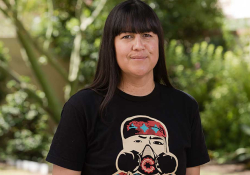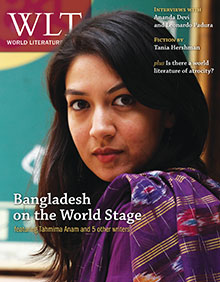Bangladesh on the World Stage: An Introduction
Beneath the twin pillars of Bangla-language poets Rabindranath Tagore and Kazi Nazrul Islam—icons so revered that enormous statues of twin doves, in their honor, adorn the streets of Dhaka—and owing to a linguistic loyalty tied to Bangladeshi nationalism, begun with the Language Movement in the 1950s and its refusal to abandon Bangla for the externally enforced and mandatory use of Urdu by politically dominant West Pakistan, English-language literature in Bangladesh has taken longer to assume its role in the subcontinental boom pioneered by writers from India, Pakistan, and Sri Lanka. But now that a new generation of English-language prose writers like Tahmima Anam, K. Anis Ahmed, Maria Chaudhuri, Mahmud Rahman, Farah Ghuznavi, and Khademul Islam have emerged, the nation’s literature is poised to extend beyond its own boundaries and the boundaries of the subcontinent.
These writers use English as a medium to connect to the larger corpus of world literature, a rejection of the insularity of contemporary Bangla-language literature, which is an expansive, if closed, system. This has not always been the case: during the 1970s and ’80s, Bangla-language writers read widely, often in English, despite their loyalty to the Bangla language. Mahmud Rahman recounts a conversation with Mahmudul Haque about the inspiration for his novel Onur Pathshala—a 1965 story from the New Yorker. The title of his novel Jibon Amar Bon was inspired by Pasternak’s poem “Sister My Life.”
The emergence of English-language writing from Bangladesh does not represent a downtick in the production of Bangla-language literature, but hopefully will encourage a greater engagement with world literature for its Bangla-language counterpart. The English fluency required to write creatively does, to some degree, represent a level of education not available to all Bangladeshis. To assume all Bangladeshis speak Bangla is also a mistaken notion. Several indigenous communities, especially near the border of Myanmar, speak and write other languages, like Chakma, a related but unintelligible language from the Chittagong Hill Tracts. In its commitment to minority languages, World Literature Today’s showcase of contemporary Bangladeshi literature includes two poems by the emerging Chakma-language poet Sudipta Chakma Mikado, translated into English for the first time, that represent both the linguistic and social oppression faced by the Chakma people.
The stories and poems in this showcase merely scratch the surface of contemporary Bangladeshi literature, a rich and richly varied sampling from one of the world’s most heavily populated nations, an emerging economic player with a strong tradition of artistic production.
Los Angeles





